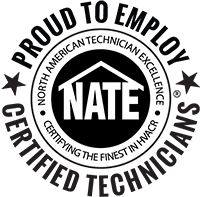See Our Most Frequently Asked Questions for Plumbing, Heating, and Cooling Services in South Bend, IN
Plumbing FAQs
1. How can I prevent clogged drains?
You can prevent clogged drains by ensuring no foreign objects enter the drain lines. I.E., grease, tampons, sanitary wipes, etc.
2. What should I do in case of a plumbing emergency?
In case of a plumbing emergency, you can shut the main water line off to the house and then call a plumber for service.
3. How do I fix a leaky faucet?
There is typically a cartridge that needs replaced or the faucet itself may need replace depending on where the leak is coming from.
4. Why is my water pressure low?
Water pressure may be low due to a leak somewhere in the water lines or a clog is beginning to form. We recommend calling for service before the issue becomes bigger.
5. Do plumbers fix water heaters?
Yes, we repair water heaters as well as replace them. We offer a 6-year manufacturerwarranty as well as a 1 -year labor warranty. We have several options when it comes to financing for a new water heater.
6. How often should I have my plumbing inspected?
You should have your plumbing inspected once a year. We offer this as an option in our Customer Care Agreement.
7. What causes my toilet to keep running?
You toilet could be constantly running due to the inner workings of the tank going bad or have been completely broken. We recommend calling for service.
8. What causes a clogged drain/what to do with a clogged drain?
A clogged drain is caused by foreign objects entering the drain line. When you believe you have a clogged drain, you should callfor service and avoid using toilets, sinks, showers, etc., until a plumber/drain cleaner can get to your home. We do NOT recommend using drain clearing chemicals.
9. What to do if my toilet overflows?
If your toilet overflows, shut the water off from the stop, typically located to the left of the toilet to the ground. Once you have shut that off try a plunger, if that does work call for service as the issue may go further than the toilet itself.
HVAC FAQs
1. How often should I service my heating system?
You should have your heating system maintenance done once a year for proper cleaning and safety inspection of the heat exchanger element. Our maintenance plan includes a safety check list that our technicians complete on the maintenance visit.
2. What are the signs that my furnace needs repair?
Signs that your furnace may need repaired may be that the unit is struggling to satisfy the desired temperature of the home, unit is turning on and off frequently (we call this short cycling), or if you hear any abnormal noises.
3. How can I improve the efficiency of my heating system?
There are a lot of ways to improve the efficiency of your heating system. Having a properly insulated home is number one. Otherthings may include making sure allfloor or wall vents are open to ensure warm air is getting to the desired parts of your home, changing the filter on time (1" Filters = 1 x a month, 5" Fitters = 1 x every 6 months — Other factors can change these numbers such as number of people in the home and/or pets)
4. Why is my heating system blowing cold air?
If your heating system is blowing cold air there is some sort of restriction for the natural gas, LP, or electric not getting to the furnace. We would recommend calling for service.
5. How long does a typical furnace last?
A typical furnace will last you 15-20 years AS LONG AS IT IS PORPERLY MAINTAINED EVERY YEAR. Equipment warranties also play a factor in the life of your equipment. Our Customer Care Agreement includes this cleaning and safety inspection.
6. What size unit do I need?
The size of a furnace can depend on many varied factors. The size of the home, where the home is located, orientation of home on the property, insulation in the home, number of doors, windows, as well as building materials that were used to build the home. We consider this when performing a load calculation.
7. What is HVAC?
Heating — Ventilation — Air Conditioning



